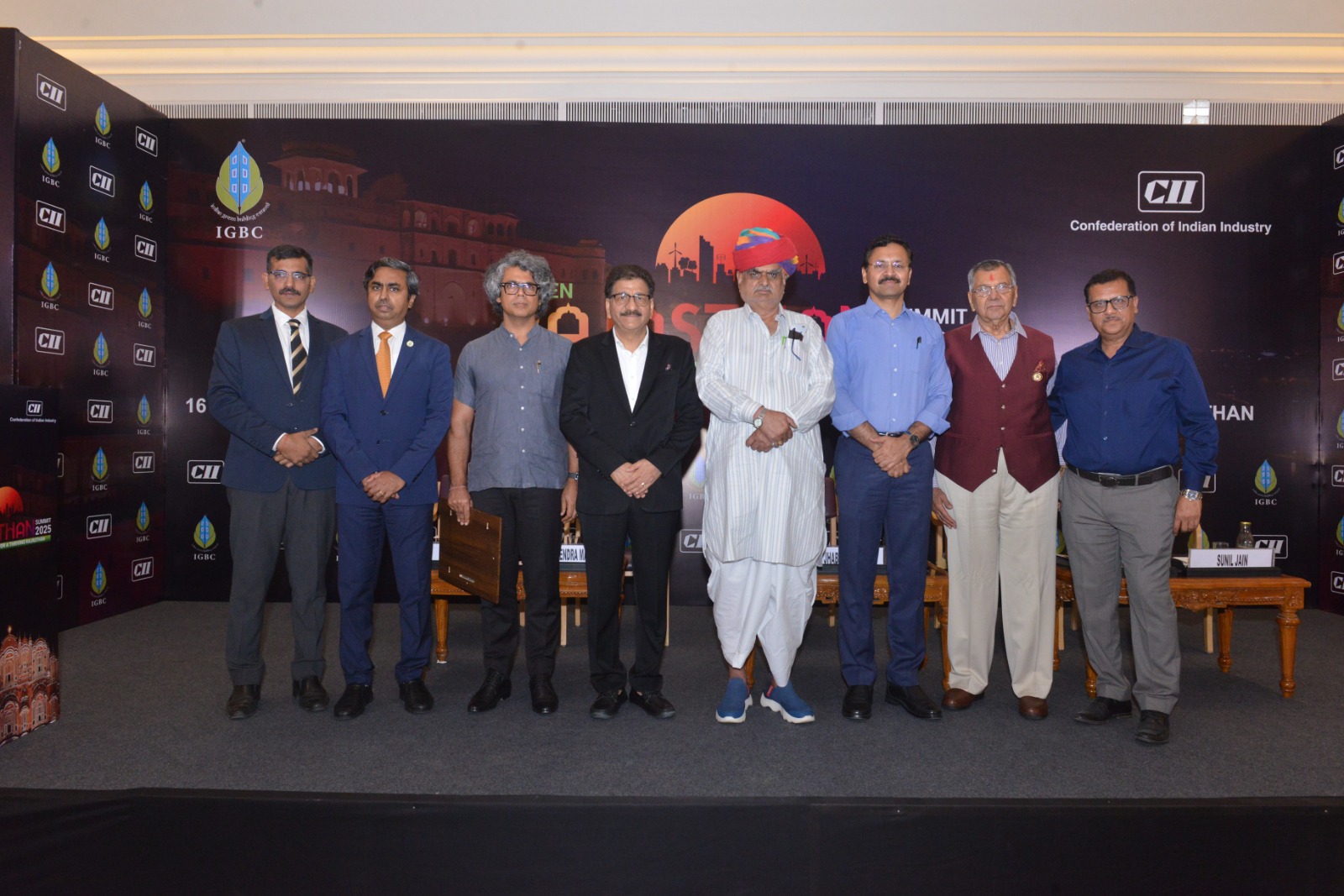Jaipur, April 17, 2025: The CII Indian Green Building Council (IGBC), successfully hosted the Green Rajasthan Summit 2025 in Jaipur, under the overarching theme “Green Innovations for a Thriving Rajasthan.” The summit served as a strategic platform that brought together policymakers, industry leaders, urban planners, and sustainability professionals to deliberate on actionable pathways for environmentally responsible growth in Rajasthan. It fostered meaningful dialogue around innovative solutions, policy interventions, and collaborative efforts required to steer the state toward a greener future.

As Rajasthan continues to witness rapid urbanization and infrastructure development, the summit highlighted the pressing need to embed sustainability into every stage of growth. From planning to execution, the emphasis was placed on adopting practices that preserve ecological balance, optimize resource use, and build long-term resilience against environmental challenges.
The inaugural session was graced by Shri Jhabar Singh Kharra, State Minister (Independent Charge) Urban Development & Housing Department, Government of Rajasthan; along with Shri Vaibhav Galriya, IAS, Principal Secretary, Urban Development & Housing Department, Government of Rajasthan; Mr Dhirendra Madan Chairman, IGBC Jaipur Chapter; Mr. Sunil Jain, Co Chairman, IGBC Jaipur Chapter; Mr M Anand, Deputy Executive Director, CII-IGBC; and IGBC members.
Shri Jhabar Singh Kharra, Minister (Independent Charge), Urban Development & Housing, Government of Rajasthan reiterated the government’s proactive stance on sustainable urban planning. He said, “I would like to thank IGBC for organizing the Green Rajasthan Summit and bringing together key stakeholders to advance sustainable development in our state. The Government of Rajasthan is committed to promote green buildings and continuing to offer policies and support the developers with incentives. I think it is important we look back to our ancestral wisdom, which integrated nature with architecture, using local and natural materials that were climate responsive and resource efficient. Water, one of our most critical resources, should be conserved and we must adopt measures that saves every drop. I would humbly request all stakeholders to join the Green Building Movement and work together for a low-carbon, resilient, and greener Rajasthan.”
Shri Vaibhav Galriya, IAS, Principal Secretary, Urban Development & Housing Department, Government of Rajasthan delivered the Special Address. He said, “The Department of Urban Development & Housing is actively supporting the green building movement by offering incentives that encourage sustainable development across Rajasthan. To fully realize the benefits of this green transition, we need capacity building—both within the government departments and among the developer community. The Government of Rajasthan is working towards aligning our upcoming building bylaws keeping sustainable parameters and our state’s citizen wellbeing. I request innovators, professionals, and stakeholders to come forward with green and practical solutions while raising awareness also drive implementations to mitigate the effects of climate change and shape a resilient built environment.”
The Government of Rajasthan is actively promoting sustainable construction through a series of incentives aimed at encouraging IGBC-rated green buildings. The Urban Development Department offers additional Built-up Area Ratio (BAR) free of charge for projects certified by the Indian Green Building Council (IGBC): 0.075 BAR for Silver-rated, 0.10 BAR for Gold-rated, and 0.15 BAR for Platinum-rated developments. This initiative is designed to reward environmentally responsible design and construction, helping developers make more efficient use of their land while contributing to a greener urban landscape.
Mr. Dhirendra Madan, Chairman, IGBC Jaipur Chapter & CMD, Mahima Real Estate Pvt. Ltd., highlighting IGBC’s commitment to fostering green ecosystems through stakeholder collaboration and innovation said “The Green Rajasthan Summit marks a significant milestone in our journey toward building a greener, healthier, and more sustainable Rajasthan. At IGBC, we are proud to work alongside government bodies, industry leaders, and local communities to accelerate the state’s transition to a low-carbon future. Through our green building rating systems, capacity-building programs, and collaborative initiatives, we aim to foster sustainable development across urban and rural landscapes. Together, let us reimagine Rajasthan as a beacon of green growth and climate resilience for the nation.”
The summit’s first panel discussion, titled “Unlocking Rajasthan’s Green Potential: Policy & Regulatory Pathways,” brought together senior government officials and sectoral experts to examine the current regulatory landscape and propose reforms to accelerate green growth. Panelists explored themes such as sustainable urban governance, resource efficiency, community participation, and financial incentives. Experts from the CREDAI Rajasthan, ASHRAE, Mahindra SEZ, and Northwestern Railway shared practical insights and discussed opportunities for scaling green initiatives across both public and private sectors.
The technical session, “Green Building Technologies: Innovations & Solutions for Rajasthan,” focused on state-specific sustainable construction practices. Key industry stakeholders highlighted next-generation technologies aimed at reducing carbon footprints, improving building performance, and optimizing operational costs. Insights from Saint-Gobain, Panache Greentech, and JK Cement covered advancements in building materials, urban heat island mitigation, and eco-friendly coatings. The session demonstrated how innovation in design and materials can align economic development with environmental stewardship.
A second panel discussion, “Building Resilience – Water, Energy, and Waste Management Strategies,” addressed the urgency of climate adaptation in Rajasthan. Experts examined integrated solutions for water conservation, renewable energy deployment, smart waste management, and capacity building. Panelists included representatives from IIID Jaipur Chapter, Indian Plumbing Association, TODAR, MNIT Jaipur, and De Calorie Energy. The discussion reinforced the importance of systems thinking, technological integration, and public-private collaboration in addressing the challenges of water scarcity, extreme heat, and solid waste accumulation.
The Green Rajasthan Summit 2025 concluded with a collective commitment to accelerate the transition towards a greener, low-carbon future. The Indian Green Building Council reaffirmed its dedication to supporting Rajasthan’s urban transformation through knowledge sharing, policy advocacy, and project facilitation. With strategic investments in green technologies, supportive governance frameworks, and active stakeholder engagement, Rajasthan is well-positioned to emerge as a leader in sustainable urban development in India.
